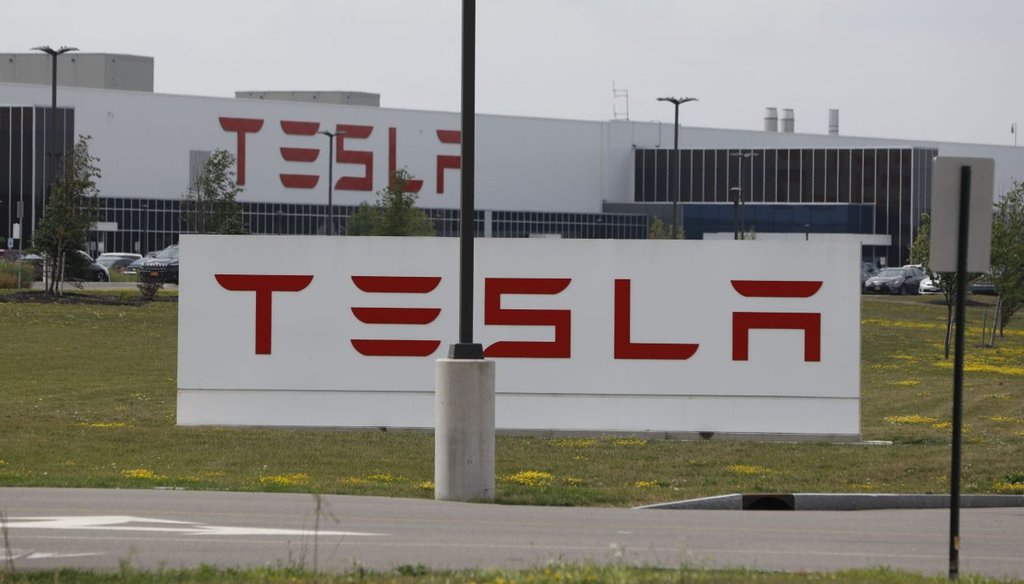

Our only agenda is to publish the truth so you can be an informed participant in democracy.
We need your help.


The Tesla factory in Buffalo. (Derek Gee/Buffalo News file)
U.S. Rep. Chris Jacobs talked about his criticisms of the Build Back Better bill during an interview on WBEN. The Orchard Park Republican called the bill a "socialist wish list extraordinaire." The bill's $1.75 trillion in spending over 10 years would expand the welfare state, Jacobs said.
"This one here has subsidies for people making as much as $800,000 to be able to buy a Tesla," Jacobs told the radio station’s morning show listeners on Nov. 19, just after House Minority Leader Kevin McCarthy gave an hours-long speech criticizing the bill.
The House of Representatives passed the bill later that day. So was Jacobs correct? Can people making as much as $800,000 get a subsity for a Tesla?
We reached out to Christian Chase, Jacobs’ press secretary, and he sent us news articles about how the tax credits would help wealthy families, those making up to $500,000. He said an earlier version of the bill put the income limit at $800,000.
We also reached out to the Tax Foundation, a think tank that generally has a pro-business leaning and favors tax measures it believes will spur economic growth. Senior analyst Garrett Watson said the most recent version of the Build Back Better legislation would provide an electric vehicle tax credit of up to $12,500 to households earning up to $500,000 for married couples filing jointly. For individuals, the maximum income would be $250,000, and for single-income households, the income limit would be $375,000.
The version proposed earlier, on Oct. 28, would have provided a tax credit for households up to $800,000, Watson said.
A summary of the bill, from the House Rules Committee, states that plug-in electric pick-up trucks, vans, and SUVS up to $80,000, or other vehicles up to $55,000, would be eligible. The maximum credit would be $12,500, but the amount varies, with increased incentives for vehicles made in the United States and those manufactured by unionized workforces. Tesla vehicles under the price threshold would be eligible for some of the credit, but its workforce is not unionized.
The Senate has not voted on the bill. Negotiations on what to include in the Senate’s version are expected, and it’s possible that if this legislation becomes law, the electric vehicle tax credits could change.
Jacobs said the Build Back Better bill would provide tax credits to people making as much as $800,000 for their Tesla purchases. That's not right. The bill calls for tax credits for joint filers with incomes up to $500,000.
An earlier version of the bill would have allowed for incomes up to $800,000, but Jacobs made his claim more than two weeks after the income threshold had changed. This is not some obscure piece of legislation followed only by interested trade groups, with few details trickling into the public sphere. The Build Back Better bill has been a story of national interest. The House minority leader for Jacobs and other Republicans had just given the longest House floor speech in history about the Build Back Better vote. The Wall Street Journal's coverage of the bill included a Nov. 3 report that Democrats had narrowed the income guidelines for the proposed tax credit for plug-in electric vehicles. While we don't expect members of Congress to read every Wall Street Journal article, we do expect them to be reasonably up to date on the facts and figures about legislation before they go on a radio show to talk to the public about it.
Since his statement is not accurate, but does contain an element of truth, we rate it Mostly False.
WBEN, audio interview, "Congressman Chris Jacobs on reconciliation bill," Nov. 19, 2021. Accessed Nov. 22, 2021.
Email interview, Garrett Watson, senior policy analyst, Tax Foundation, Nov. 23, 2021.
Reuters, "U.S. Democrats' plan boosts EV tax credit eligibility to pricier trucks, SUVs," Nov. 3, 2021. Accessed Nov. 23, 2021.
CNBC, "EV tax credits in Biden’s Build Back Better Act will help sell more cars than new chargers in infrastructure bill," Nov. 19, 2021. Accessed Nov. 23, 2021.
New York Times, "Fact-Checking Kevin McCarthy’s 8-Hour Speech," Nov. 19, 2021. Accessed Nov. 24, 2021.
Rules Committee, section-by-section summary, "Build Back Better Act — Rules Committee Print 117-18." Accessed Nov. 24, 2021.
Email interview, Christian Chase, press secretary, Rep. Chris Jacobs, Nov. 24, 2021.
CNN, "Schumer says Democrats will negotiate with Manchin and Sinema on Build Back Better plan and wants bill done by Christmas," Nov. 21, 2021. Accessed Nov. 24, 2021.
Wall Street Journal, "How Tax Credits and Government Subsidies Have Aided the Electric-Vehicle Market," Nov. 22, 2021. Accessed Nov. 24, 2021.
Wall Street Journal, "House Democrats Add Paid Leave, State-and-Local Tax Deduction to Bill," Nov. 3, 2021. Accessed Nov. 26, 2021.
In a world of wild talk and fake news, help us stand up for the facts.
